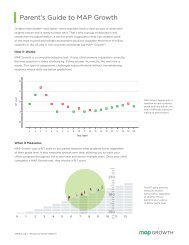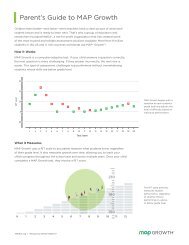elemapr17
Create successful ePaper yourself
Turn your PDF publications into a flip-book with our unique Google optimized e-Paper software.
www.parent-institute.com<br />
Read aloud to build your child’s<br />
listening skills and memory<br />
Even if your child<br />
knows how to read,<br />
it’s helpful for you<br />
to continue reading<br />
aloud to him.<br />
Reading aloud gives your child<br />
important quality time with you—<br />
and it exposes him to ideas, concepts<br />
and vocabulary he might not get<br />
otherwise. Each time you read<br />
together, you add to his storehouse<br />
of knowledge and strengthen his<br />
reading comprehension skills.<br />
To boost your child’s vocabulary<br />
skills as you read, define words he<br />
doesn’t know. Then ask if he can<br />
think of words that have a similar<br />
or opposite meaning.<br />
From time to time, see if your<br />
child can figure out the meaning of<br />
an unknown word by how it’s used<br />
in a sentence. Give examples of how<br />
the word might be used in other<br />
Everyone wins when parents<br />
volunteer and get involved!<br />
Have you ever<br />
thought about<br />
volunteering at<br />
school? National<br />
Volunteer Week,<br />
which begins April 23, is the<br />
perfect time to give it a try.<br />
Here are five reasons to get<br />
involved:<br />
1. Your child will benefit. Even<br />
if you’re not in his classroom,<br />
your child will know you’re at<br />
school. He’ll feel important and<br />
he’ll know you think learning is<br />
important, too.<br />
2. You’ll get to know your child’s<br />
teachers and other school staff.<br />
That makes it easier to ask for<br />
help when your child needs it.<br />
contexts. For example, note how<br />
the word sign can be a noun (Look<br />
at the stop sign) or a verb (Please<br />
sign your name here).<br />
As you read, you can also help<br />
your child strengthen other skills,<br />
such as:<br />
• Listening and speaking. After<br />
you’ve read a passage, have your<br />
child tell you what he heard. Ask<br />
specific questions—What did<br />
... do? Why? Where ... ? How ... ?<br />
What color was ... ?<br />
• Memory. Don’t just start reading<br />
where you left off in a book the<br />
night before. First ask your child<br />
to recall where you were in the<br />
story.<br />
• Word recognition. Stop reading<br />
periodically. Ask your child to read<br />
a sentence or two to you. Help him<br />
sound out new words. Then have<br />
him read the sentences again.<br />
3. The school will benefit. Whether<br />
you read to a class, help in the<br />
cafeteria or tutor students in the<br />
library, you’ll be freeing school<br />
staff to spend more time with<br />
kids who need it. And that leads<br />
to more learning.<br />
4. Volunteering is easy. Many<br />
schools offer training to volunteers.<br />
And there are volunteer<br />
jobs that can be done at home,<br />
at night or on weekends. So every<br />
parent can get involved.<br />
5. Volunteering is fun. You’ll meet<br />
other parents in your neighborhood.<br />
You may learn new skills.<br />
And you’ll get a good feeling from<br />
knowing you’ve done something<br />
worthwhile.<br />
Copyright © 2017, The Parent Institute®<br />
Q: My eight-year-old daughter<br />
has tantrums when she gets<br />
angry or frustrated. She’s acting<br />
the same way in school, and her<br />
teacher has asked for my help<br />
in getting her to control herself.<br />
What can I do?<br />
Questions & Answers<br />
A: Elementary-age children have<br />
more stress in their lives than most<br />
parents realize. When they don’t<br />
have the skills to cope with stress,<br />
they may resort to toddler-style<br />
outbursts and crying fits.<br />
However, your daughter’s<br />
success in school and with other<br />
children depends on her learning<br />
how to control her behavior.<br />
To minimize temper tantrums,<br />
first try to figure out what triggers<br />
them. Keep a record of your child’s<br />
behavior for one week. What<br />
happens just before a tantrum<br />
begins? Do you notice patterns?<br />
Then, help her avoid some of the<br />
situations that lead to stress.<br />
Next, give your child tools to<br />
manage her behavior. When she<br />
has a meltdown at home, suggest<br />
that she:<br />
• Take time out. Have her remove<br />
herself from the situation for a<br />
five-minute breather. Let her<br />
return when she feels composed<br />
enough to talk calmly.<br />
• Use calming techniques.<br />
Teach her to breathe deeply,<br />
while slowly counting to 10.<br />
Have her dribble a ball, pet an<br />
animal, or tell herself, “I can<br />
work through this.”<br />
• Throw it out. Have her write<br />
or draw her angry feelings on<br />
paper. Then have her wad the<br />
paper up and toss it away.<br />
• Talk it out. Help your child<br />
become more self-aware. Note<br />
when she’s having a bad day.<br />
Help her name her feelings.<br />
April 2017 • Elementary • Parents make the difference! • 3

















